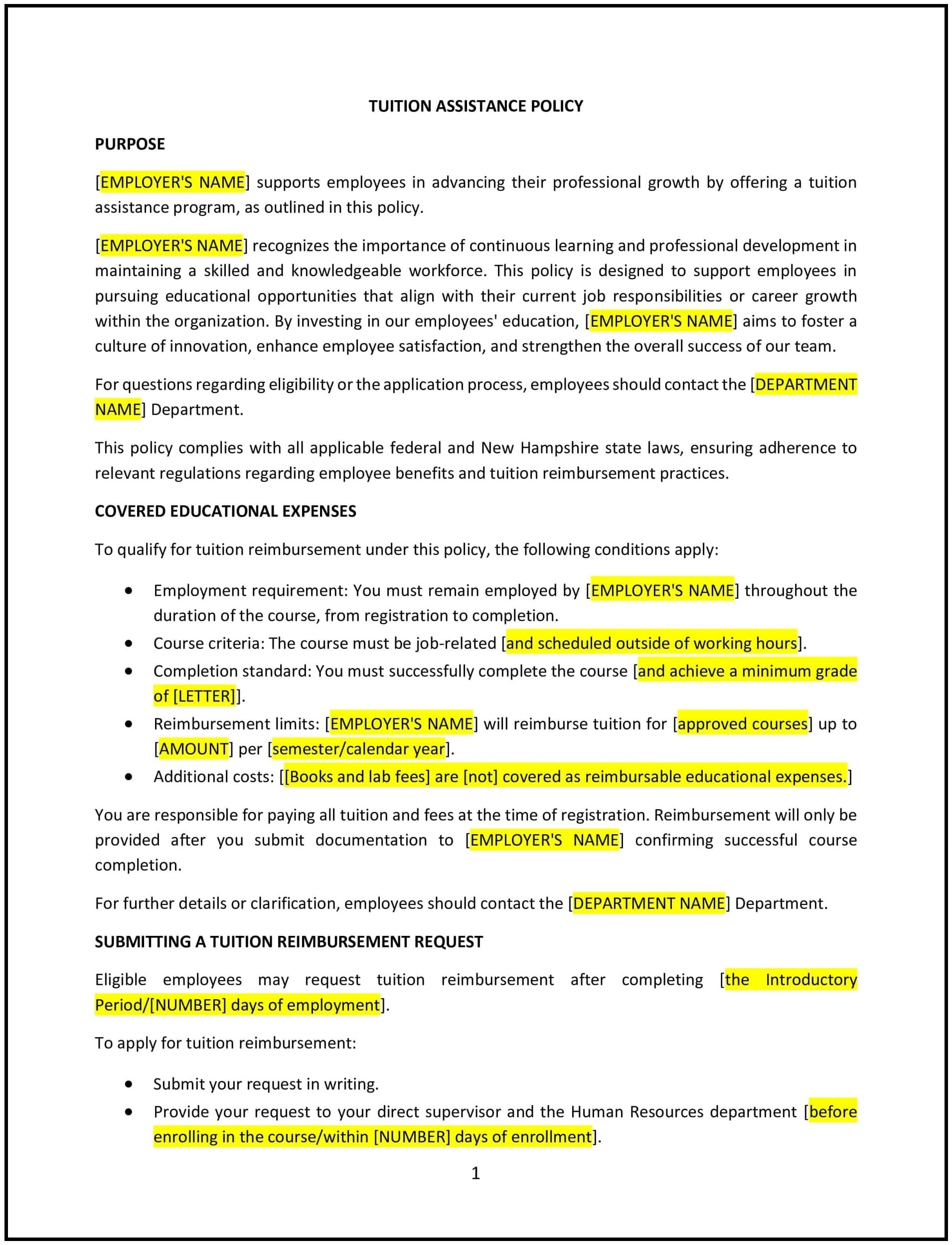Tuition assistance policy (New Hampshire): Free template
Got contracts to review? While you're here for policies, let Cobrief make contract review effortless—start your free review now.

Customize this template for free
Tuition assistance policy (New Hampshire)
A tuition assistance policy helps New Hampshire businesses support their employees' educational development by providing financial assistance for job-related courses, certifications, or degree programs. This policy outlines the eligibility criteria, application process, and reimbursement details for employees seeking to enhance their skills and qualifications through education.
By implementing this policy, businesses can foster a culture of continuous learning, improve employee retention, and ensure that employees have the knowledge needed to contribute effectively to the company’s success.
How to use this tuition assistance policy (New Hampshire)
- Define eligible programs: Clearly state which types of courses, degree programs, or certifications qualify for tuition assistance. This may include job-related education or programs that align with the company’s business needs.
- Set eligibility criteria: Specify the requirements for employees to qualify for tuition assistance, such as length of employment, job performance, and relevance of the program to their role or career growth.
- Outline financial assistance details: Indicate how much financial assistance the company will provide, whether it's a set amount per year, a percentage of tuition, or full reimbursement for eligible courses.
- Specify reimbursement process: Describe the process for employees to receive reimbursement, including any required documentation (e.g., receipts, grade reports) and the timeline for reimbursement.
- Establish a cap or limit: Define any limits on the total amount of tuition assistance an employee can receive, either per year or per degree/certification.
- Address repayment obligations: Specify if employees need to repay the tuition assistance if they leave the company within a certain period after receiving the benefit.
- Communicate the application process: Outline the steps employees should follow to apply for tuition assistance, including deadlines, required forms, and approval procedures.
- Review and update: Periodically review and update the policy to reflect changes in company goals, educational opportunities, or market conditions.
Benefits of using this tuition assistance policy (New Hampshire)
This policy provides several benefits for New Hampshire businesses:
- Promotes employee development: By offering tuition assistance, businesses invest in their employees' education, enhancing their skills and knowledge.
- Increases employee retention: Employees who receive tuition assistance are more likely to stay with the company long-term, reducing turnover and recruitment costs.
- Improves business performance: Well-educated employees bring improved performance, innovation, and efficiency to the business, aligning with company goals.
- Attracts top talent: A strong tuition assistance policy can attract highly qualified candidates who value professional development opportunities.
- Supports career growth: Employees benefit from opportunities to advance their careers through education, leading to greater job satisfaction and motivation.
Tips for using this tuition assistance policy (New Hampshire)
- Communicate the policy clearly: Ensure that all employees are aware of the tuition assistance program and understand the eligibility requirements, application process, and reimbursement terms.
- Encourage participation: Actively promote the tuition assistance program to employees, highlighting the benefits of continuing education and the company's support for career development.
- Track progress: Keep track of employees who apply for and benefit from tuition assistance, ensuring that they meet the necessary criteria and submit required documentation for reimbursement.
- Align with business needs: Ensure that the education supported by the policy aligns with the company’s business goals, such as skills that contribute to operational success or leadership development.
- Review the policy regularly: Periodically review the tuition assistance policy to ensure it reflects changes in the company’s goals, industry standards, or employee needs.